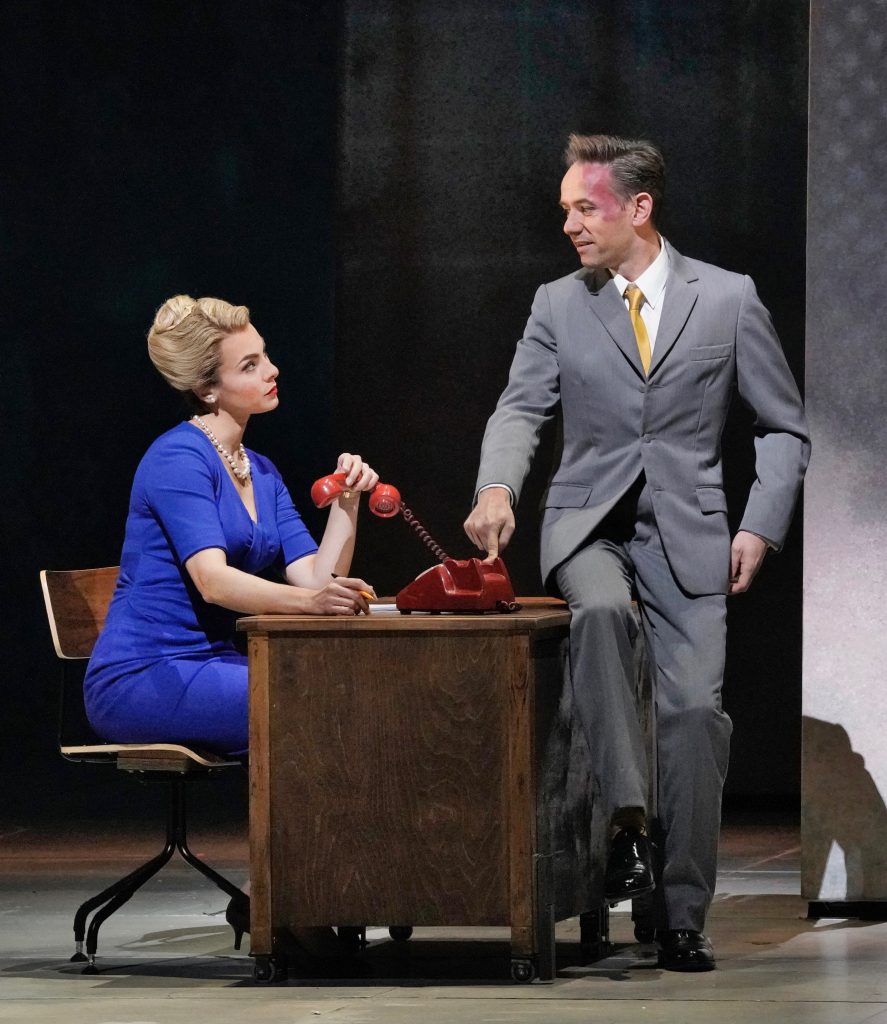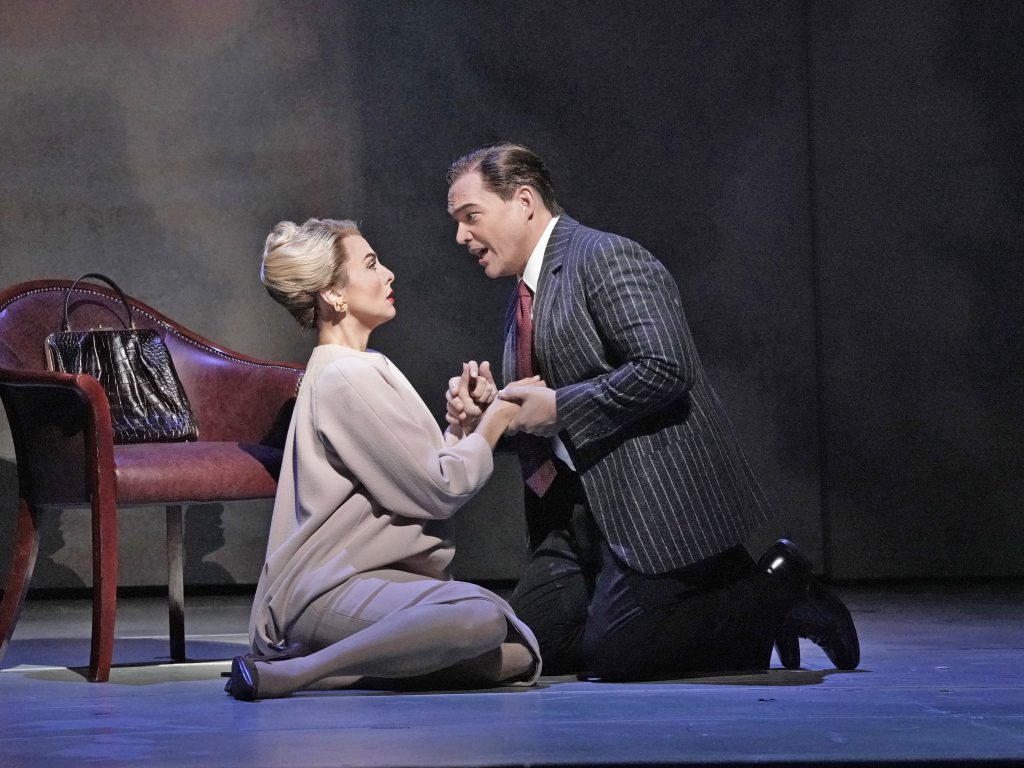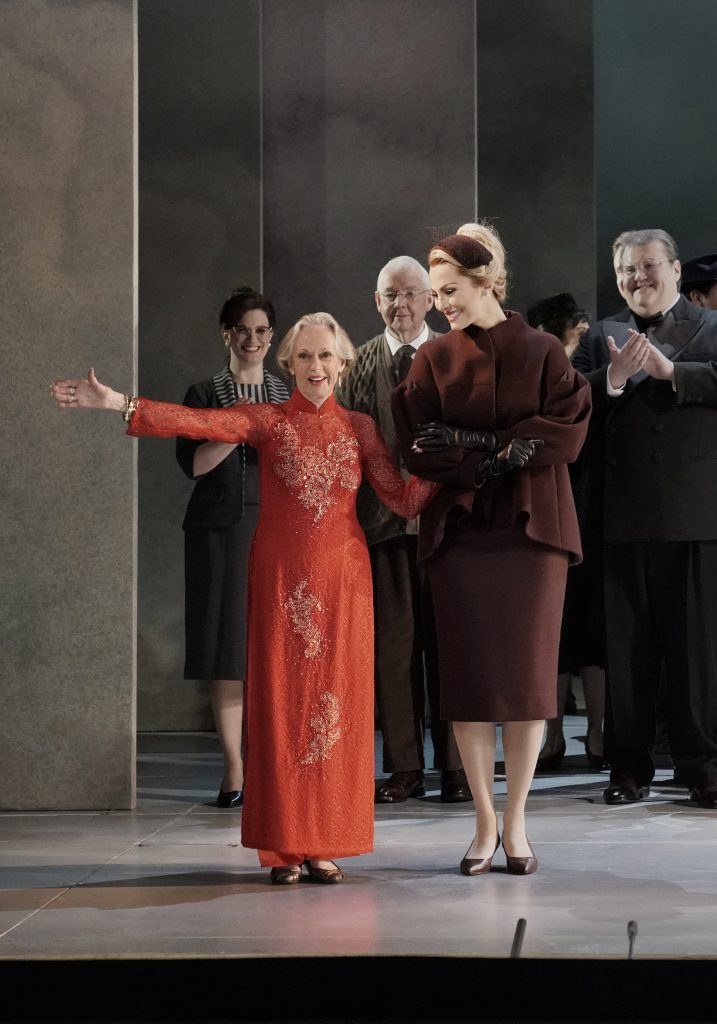Dazzling visuals outshine uneven score in Met’s “Marnie” premiere

Isabel Leonard and Iestyn Davies in Nico Muhly’s “Marnie” at the Metropolitan Opera. Photo: Ken Howard
Alfred Hitchcock has made it to the Metropolitan Opera stage—sort of.
The new opera Marnie by Nico Muhly, with a libretto by Nicholas Wright, had its American premiere at the Met on Friday night. The work follows the story of a young woman who assumes a series of identities to steal from her employers. She eventually is able to come to terms with the deeply repressed childhood trauma that fuels her behavior, but not before being blackmailed into marriage by one of her targets.
This story is most famous in its Hollywood form, a 1964 thriller by Hitchcock, but Muhly and Wright’s opera more closely follows the original 1961 novel by Winston Graham. Even so, the debts to the master filmmaker’s style are evident in the spellbinding production by Michael Mayer, the same given at the English National Opera premiere in 2017.
Striking images and eye-catching flashes of color seem pulled right off the silver screen. Particularly memorable are the stylish 1950’s costumes by Arianne Phillips. There are a dozen or so for the title character alone, mimicked in pastel colors for the four “Shadow Marnies”—ghosts of her many false identities who follow her almost constantly. Vivid projections designed by Julian Crouch and 59 Productions serve both to lend detail to scenes and to reflect on the state of Marnie’s inner turmoil.
Marnie makes it clear that Mayer, though still a relative newcomer to opera, has a natural feel for the possibilities of the form. (His first Met credit was the brilliant and popular “Rat Pack” Rigoletto, which debuted in 2013.) There is a rhythmic energy to this production–as other characters try to piece together Marnie’s crimes and her mysterious past, pictures of her face in countless disguises flash across the stage in perfect time with Muhly’s music. Mayer responds to the score and amplifies its dramatic effect, immersing the viewer completely in the muscial-dramatic experience.
Would that Muhly’s writing were so consistently effective. Marnie does show significant development since Two Boys, the composer’s last work to be seen at the Met. A brief, thrilling overture, complete with stings of brass, opens each act and thrusts the listener immediately into the world of big-screen psychodrama. The harmonic language here is more tart, the ideas more adventurous. And there is some breathtaking vocal writing, as at times Muhly rises to meet the level of Wright’s rich poetry.
Muhly writes searching monologues for each of the main characters, giving them aching, wandering melodies over bare-bones orchestration that features warm solos from the pit. The Shadow Marnies, too, are brilliantly realized, singing little fragments of Marnie’s inner thoughts in eerie madrigals.
Yet far too often he falls back into safe gestures, offering little more than quasi-recitatives over endless, aimless noodling in the pit. Repetitive, duple-meter figures in the winds seem at first like they might be a kind of motif, but ultimately become little more than white noise. After a while, the intimate scenes in which Marnie’s past is discovered begin to sound the same, piling up what feel like hours of tedious exposition.
The title role is a fine vehicle for Isabel Leonard. The American mezzo has earned her place as one of the company’s foremost young stars with her gorgeous, bright voice, strong musical instincts, and exemplary acting. All three are on display in her performance as Marnie, the first of three lead roles she’ll take at the Met this season.
Leonard’s rich, smoky singing and dark introspection made her monologue at the top of Act II a moment of gripping tension, as she brooded on her deep psychological wounds. The scene that left the greatest lasting impression was her trip to a psychoanalyst: possessed of icy resolve for most of the opera, she suddenly breaks down, accompanied by a haunting vocalise from the Shadow Marnies (Deanna Breiwick, Dísella Lárusdóttir, Rebecca Ringle Kamarei, and Peabody Southwell).

Isabel Leonard and Christopher Maltman in “Marnie.” Photo: Ken Howard
Christopher Maltman was vocally impressive as Marnie’s husband, Mark Rutland, his baritone powerful and oaky as ever. Yet it was difficult to feel much warmth towards his character. It was as though he was trying to play two sides at once: On the one hand, we have the vile businessman who blackmails an employee into marrying him, tries to force himself on her during their honeymoon cruise, and forces her to stay trapped in the marriage against her will.
On the other, Rutland is a husband doing all he can to shield his wife from the consequences of her past crimes and helping her to unearth the deep-seated trauma that still haunts her. Theoretically, there could be an interesting dramatic tension here, but the contradiction is barely explored in this work–an omission that seems even more glaring given how prominently sexual misconduct features in our current national discussion.
Countertenor Iestyn Davies was brilliant as Markś unscrupulous, disfigured brother, Terry, singing with a chilly clarity. His strong characterization was driven by a combination of personal ambition, familial duty, envy of his brother, and desire for revenge after having been spurned by Marnie early on. As the matriarch of the Rutland family, Janis Kelly was a grand presence, commanding attention with her strong, sharp soprano.
As Marnie’s mother, Denyce Graves sounded appropriately weary, pushing her mezzo-soprano voice down to a tired, gravelly contralto. Mezzo Jane Bunnell was harried but earnest as the nurse Lucy, and tenor Anthony Dean Griffey was amusingly blowsy as Mr. Strutt, Rutland’s business associate and Marnie’s earlier victim. The young Gabriel Gurevich impressed with his clear, pealing voice as the little boy who attends on Marnie’s mother.
In his Met debut, conductor Robert Spano did little to help illuminate Muhly’s score. Looseness of ensemble made some of the clockwork orchestral figures sound chaotic. More generally, dynamics were limp, losing the opportunity to match dramatic power onstage with theatrical flair from the pit.
The cast and crew were greeted by a warm ovation from a packed house–none warmer than that for Hitchcock’s own leading lady, Tippi Hedren, who embraced Leonard, her fellow Marnie, at the final bow.
Marnie runs through November 10 at the Metropolitan Opera. metopera.org

Tippi Hedren with Isabel Leonard at the curtain call of “Marnie” Friday night.